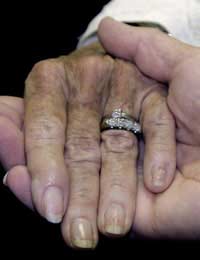Coping Emotionally with a Loss

Loss comes in different forms and there is no right or wrong way in how you should feel or cope with the loss of a loved one.
Loss and Death
You can lose someone without them dying. You may have a parent or a spouse who suffers from a disease like Alzheimers and little by little they are no longer the person you have known and loved. With each progressive step of the illness, you suffer a loss and grieve again for your loved one. You may have an adolescent child who has suffered from a brain disease like encephalitis and your previously vibrant and sassy teenage daughter has disappeared. Instead, her physical shell remains but she needs looking after like a young baby. You will grieve long and hard for the daughter you have lost at the same time as coming to terms with the complex care needs of the daughter who remains.Despite learning to live and care for your loved one, such debilitating illnesses are often incurable and when your loved one finally dies, once again you will grieve for your loss.
Grief is a Complex Emotion
Even if your loved one was very ill, you may still be shocked when they die. There will be a lot of practicalities to arrange like registering the death and arranging the funeral and you may be surprised to see how well you cope. Grief does not always happen straight away. It may only hit you when other people start to get on with their lives and you are left to consider your own.When the person you care for dies, as well as coming to terms with their death, you have to come to terms with the end of your occupation, the of your caring. You may have mixed emotions of sadness for your loss, elation at being free to live your own life again and guilt for wishing to do so. If you have lost your lifetime partner, you will also feel tremendously lonely.
Grief Returns in Waves
Until you lose someone you have dearly loved, you cannot know how you will cope with the grief or how long it will take. However, it is often said that it returns in waves. Initially, the waves are so intense and constant that you wonder how you will survive them. As time passes, although the waves continue to hurt deeply and you may weep whenever you think of your loved one, the grief does somehow become more bearable. You gradually learn that each wave will be lived through.Who Can Help?
The most help and support often comes from the people you know best – and who know you best. You may find that some people seem awkward around you, often because they want to do and say the ‘right thing’ but are not sure what that is. If you feel able, tell the people you care about what you need from them and how they can help.Talking about what has happened, and about the person who died, can help you to come to terms with their death, and to cope with the feelings you have. Friends and relatives who knew the deceased when they were healthy and can share memories of them with you, can be a great source of support. Contact with other people who have been bereaved, and who have a better understanding of what you are going through, can also help.


Re: Could I be Exempt from Paying Car Tax?
I claim DLA i have my own car but my husband is the main driver can I still claim free car tax .
Re: Could I be Exempt from Paying Car Tax?
Hi there I receive adult disability and my mum is my driver and carer takes me to all my appointments and for…
Re: Could I be Exempt from Paying Car Tax?
My mum is 91 yrs old and has a blue badge. I am her main carer and I take her to her appointments and shopping. Am I…
Re: Could I be Exempt from Paying Car Tax?
I'm a full time carer for my step dad he doesn't drive but I do have my own car can i get free road tax and how do I…
Re: Could I be Exempt from Paying Car Tax?
My career as her own car can she drive it with out me in the car because I can’t go to do shopping so she dose it…
Re: Could I be Exempt from Paying Car Tax?
Hi I'm a carer for my 82 year old mother. She's recieves disability benefits because she's is blind in 1 eye and…
Re: Carer's Allowance
I on carer allowance and work on part time 5 h a week. I am 21 years old and ask8ng. I am must pay may doctor and prescription and…
Re: Health Benefits For Carer's
Can I get discount on carers allowance for glasses
Re: Health Benefits For Carer's
Hi I get 67 a week carer's allowance same as jsa. Am I allowed free eye test dental care and prescriptions. My husband is on state…
Re: Health Benefits For Carer's
Do you get help on council tax on carers allowance